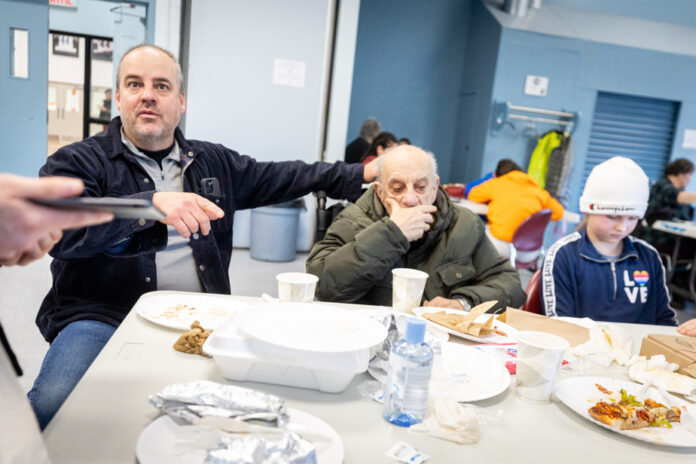“If we hadn’t gone to see my dad, he might be dead,” Carlos Martinez drops. A few hours earlier, he had found his father dozing at home, the gas stove on, as he tried to warm himself.
Fortunately, the octogenarian is doing well, says Carlos Martinez.
La Presse met him on Saturday at the Beaconsfield Recreation Center, where he was spending a third consecutive day with his wife, Marianne Kwiatkowski, and their four children.
Nearly 132,000 homes remained without power around 10 p.m., and at least 100,000 customers could have to wait until Monday to find power, warns Hydro-Quebec.
In Montreal, residents of the West Island were among the last to be reconnected on Saturday evening. For some, the wait has become unbearable.
Earlier in the day, Carlos Martinez and his wife visited his father, who was also out of power, in Pierrefonds. They found him dozing on the sofa, the gas stove on.
“Imagine how many people do that!” We know it’s dangerous, but we do it when we’re cold,” said Marianne Kwiatkowski.
More than a hundred people were taken to hospital in Montreal and Laval to be treated for symptoms of carbon monoxide poisoning, according to Urgences-santé.
Recall that a man lost his life Friday by carbon monoxide poisoning, while trying to warm up, in Saint-Joseph-du-Lac. “One death too many,” said Economy and Energy Minister Pierre Fitzgibbon.
Hydro-Quebec expected to have reconnected a million of its customers by midnight Saturday, about 72 hours after a major episode of freezing rain plunged more than 1.1 million homes into darkness on Wednesday.
Nearly 120,000 customers remained without power around midnight Sunday, while about 1,500 Hydro-Quebec employees were working on the ground to reconnect them.
“We’re really falling into the part of our plan where we’re going to start restoring outages where fewer customers are impacted. The rate of recovery will decrease. Breakdowns could take longer to repair in areas that are more difficult to access,” said the director, energy system control at Hydro-Québec, Maxime Nadeau, in a press briefing.
In order to give a boost to Quebecers who have been deprived of power for a long time, grocery stores, including supermarkets, are authorized to open this Sunday, even if it is a public holiday.
In Beaconsfield on Saturday, about 40 people, including children and seniors, were enjoying electricity at the emergency shelter.
Among them is Janice Taylor looking at her fully charged phone. The night before, she slept on one of the camp beds provided by the center, and she is about to do so again tonight.
“I slept at home with a toque, gloves, frozen nose. It was too hard,” she says with a smile.
Only downside: she discovered the shelter by chance, the information having been communicated by email, inaccessible without internet, she laments. “This morning, I informed all my neighbors, door to door. Nobody knew,” says Taylor.
Further on, Danny Huang plays cards with his wife and teenage daughters. “We’re killing time!” “, he launches. At least here he can speak louder than in the library, he adds.
A total of 129 people, including 50 families, spent the night from Thursday to Friday in one of these shelters in Montreal.
To customers frustrated to have lost power again, Maxime Nadeau of Hydro-Québec confirms that this can unfortunately happen in the event of major reconnections.
“It happens when you reconnect customers who have been interrupted for a long time. It requires more electricity, so it can generate an additional break that we have to repair on the network, “he said on Saturday.
The other three most affected regions are Outaouais, with nearly 15,000 customers affected, Montérégie, with more than 13,000 affected, and Laval, with more than 9,000 customers in the dark.
In a scrum in Montreal, the Minister of Public Safety, François Bonnardel, announced financial assistance to help cities affected by the blackouts in the establishment of emergency services.
He also acknowledged that the situation was not easy for people who have had no electricity for almost four days.
“We learned about emergencies, like the pandemic, so we were able to put measures in place to meet their needs, so they could keep warm, power up their electrical appliances, and even sleep indoors,” he underlined during his visit to the Lasallian Center, which serves as a temporary refuge in the Saint-Michel district.
“We’re doing everything we can to make life a little more enjoyable, but I know everyone wants to get back connected as soon as possible. »


















